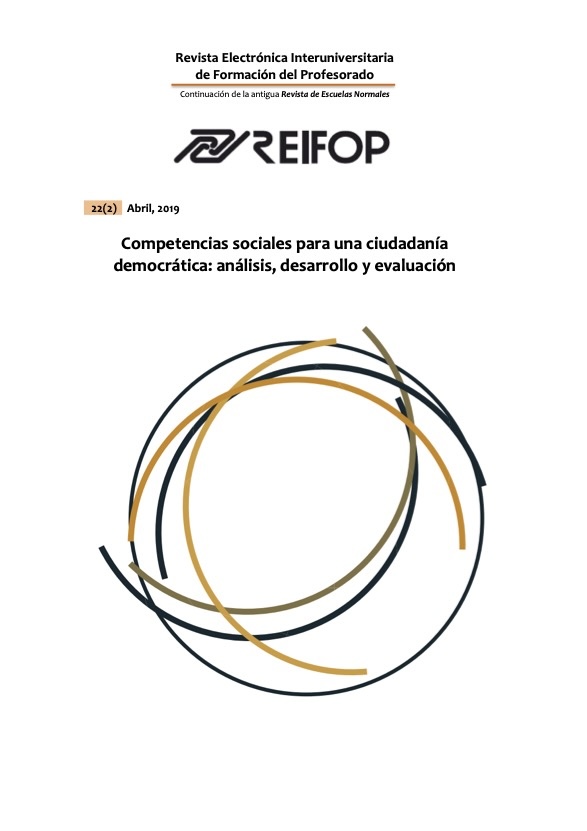THE MAZE: Gamifying the concept of identity
Abstract
The current work shows the design process, implementation and evaluation of the didactic unit "The Maze: Us and them", developed by members of the research group DHiGeCs of the Universidad de Barcelona. This is an implementation based on Gamification as a didactic strategy, whose thematic core are identity and difference, oriented to the Social Sciences subject and the work of social and civil competency. Its development has required to reinterpret historical materials from the point of view of the game, leading to think and debate about "Us and them", from a cohesive, tolerant with diversity and civic approach. With the Learning Management System called Classcraft as additional resource, game elements have complemented the educational practice activities, with which the students interact through personalized avatars.The significant learning acquired "inside the labyrinth" is remarkable by the excitement and enthusiasm to follow the rules of the game. The evaluation research carried out in different secondary schools has offered satisfactory results, highlighting an increase in motivation and commitment both by the students and the teachers involved.
Downloads
References
Bartle, R. (1996). Hearts, Clubs, Diamonds,Spades: Players Who Suit MUDs. Journal of MUD Research, 1, 1.
Brougere, G. (2013). El niño y la cultura lúdica. Lúdicamente, 2 (4).
Chou, Y. (2015). Actionable gamification. Fremont: Octalysis Media.
Huizinga, J. (1938). Homo ludens (ed. 2012). Madrid: Alianza editorial.
Kapp, K. (2012). The Gamification of Learning and Instruction: Game-Based Methods
and Strategies for Training and Education. San Francisco: John Wiley & Sons.
Marín, I. (2018). ¿Jugamos? Cómo el aprendizaje lúdico puede transformar la educación. Barcelona: Paidós Educación.
McGonigal, J. (2012). Reallity is broken. Why games make us better and how they can change the world. Londres: Vintage Books.
Medina, D. (2016). Geometría de la motivación: Juegos de rol, tecnología y filosofía. Mamakuna II, 37-45. ISSN: 1390-9940.
Monereo, C., Castelló, M., Clariana, M., Palma, M., & Pérez, M. L. (2000). Estrategias de enseñanza y aprendizaje. Barcelona: Editorial Graó.
Prats, J., Fuentes, C. y Sabariego, M. (en prensa). Investigación evaluativa de materiales didácticos para la educación política y ciudadana a través de contenidos históricos. REIFOP.
Pink, D. (2009). Drive: The suprising truth about what motivates us. New York: Riverhead.
Sanchez, E., Young, S., y Jouneau-Sion, C. (2017). Classcraft: from gamification to ludicization of classroom management. Education and Information Technologies, 22 (2), 497-513.
Vivancos, A. E., Ferrer, L. A., y López, A. J. G. (2017). Videojuegos, historia y patrimonio: primeros resultados de una investigación educativa evaluativa en educación secundaria. Revista Interuniversitaria de Investigación en Tecnología Educativa.
Watson, W. R., Mong, C. J., y Harris, C. A. (2011). A case study of the in-class use of a video game for teaching high school history. Computers & Education, 56 (2), 466-474.
Welsh, E. (2002). Dealing with data: Using NVivo in the qualitative data analysis process. In Forum qualitative sozialforschung/Forum: qualitative social research (Vol. 3, No. 2).
Werbach, K., Hunter, D. (2012). Gamificación. Madrid: Pearson Educación.
-
Abstract1600
-
PDF (Español (España))876
Los artículos que se publican en esta revista están sujetos a los siguientes términos:
1. El Departamento de Métodos de Investigación y Diagnóstico en Educación de la Universidad de Murcia (España), junto con el Servicio de Publicaciones de la Universitdad de Murcia (Editum) son los editores de la revista REIFOP y conserva los derechos patrimoniales (copyright) de los artículos publicados, permitiendo la reutilización de las mismos bajo la licencia de uso indicada en el punto 2.
2. Las obras se publican en la edición electrónica de la revista bajo una licencia Creative Commons Reconocimiento-NoComercial-SinObraDerivada 3.0 España (texto legal). Se pueden copiar, usar, difundir, transmitir y exponer públicamente, siempre que: i) se cite la autoría y la fuente original de su publicación (revista, editores y URL de la obra); ii) no se usen para fines comerciales; iii) se mencione la existencia y especificaciones de esta licencia de uso.
3. Condiciones de auto-archivo. Se permite y se anima a los autores a difundir electrónicamente las versiones pre-print (versión antes de ser evaluada) y/o post-print (versión evaluada y aceptada para su publicación) de sus obras antes de su publicación, ya que favorece su circulación y difusión más temprana y con ello un posible aumento en su citación y alcance entre la comunidad académica. Color RoMEO: verde.















